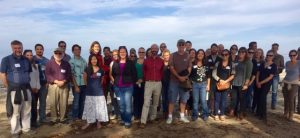This symposium was organized to look for ways to advance the use of seascape genetic methods to illuminate marine population structure and local adaptation and for meeting the goals of ecosystem-based
management.
November 10, 2016, Hyatt Regency Monterey, CA
Talks in each session followed by ~ 30 minute panel discussion.
Morning Coffee: 9:30 AM
Session 1 – 10:00 AM to 12PM Seascape Genetics: Past, Present and Future
Eric Crandall – Introduction to the Symposium
Kim Selkoe, Associate, National Center for Ecological Analysis and Synthesis
Windows on seascape genetics: syntheses of studies, datasets and approaches.
Michael Dawson, Associate Professor, UC Merced
Another 15 years of progress in phylogeography along the West Coast.
Eric Crandall, Assistant Professor, CSU Monterey Bay
What is a marine population? Investigating population structure in the Waples Zone
John Deck, UC Berkeley and Biocode LLC
Biodiversity specimens: tracking from field to lab to publication.
Lunch – 12:00 to 1:30
Session 2 – 1:30 to 3:00: Integrating Population Genetics with Oceanographic Data and Models
Chris Edwards, Professor, UC Santa Cruz
Modeling larval transport in the California Current System
John Carlos Garza, Research Geneticist, Southwest Fisheries Science Center
The inference of family relationships in the study of marine dispersal
Dale Robinson, Coastwatch Coordinator, Southwest Fisheries Science Center
Together with Robinson DR, Simons B, Mendelssohn R, Wilson C, deWitt L
Easy access to satellite environmental data for use with the seascape genetic approach.
Afternoon Coffee – 3:00 to 3:30
Session 3 – 3:30 to 5:00: Scaling from Seascape Genetics to Seascape Genomics
Cynthia Riginos, Associate Professor, University of Queensland
Navigating the currents of seascape genomics: how spatial analyses can augment population genomic studies
Steve Palumbi, Director, Hopkins Marine Station
In the genomic era, seascape genetics pivots on natural selection as well as connectivity
Giacomo Bernardi, Professor, UC Santa Cruz
Gene expression responses to ocean acidification in the black surfperch Embiotica jacksoni

